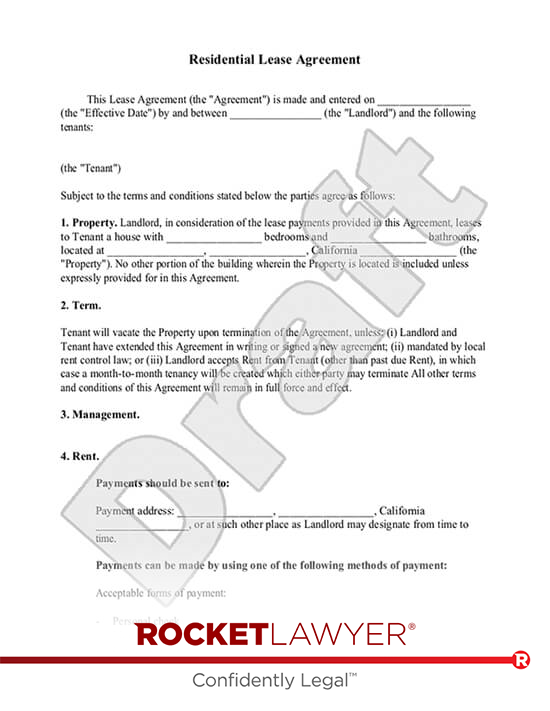Step 1: Termination of the Lease Agreement
To begin the eviction process, the landlord must send the tenant a notice of termination of the lease. The notice can list a specific reason for eviction, but it does not have to in certain cases.
There are four types of notice of termination:
- Pay Rent or Quit the Premises - This notice states a date by which the tenant must pay rent owed or move out.
- Cure or Quit - A notice like this involves a violation of the rental lease agreement. It states a date by which the tenant must move out or resolve the issue, which could be the removal of a dog not allowed by the lease or the purchase of a required renter's insurance policy.
- Unconditional Quit - This type of notice offers no other option to the tenant other than to move out by the date stated. In order for this notice to valid, many states have laws that require proof that:
- The tenant violated a major condition of the residential lease agreement.
- The tenant caused major damage to the rental property.
- The tenant engaged in illegal activity on the premises.
- The landlord plans to move into the property or allow an immediate family member to move in; this typically applies only in rent-controlled properties.
- The landlord plans to remodel the property and requires it to be vacant; this typically applies only in rent-controlled properties.
- Without Cause - The landlord does not need to give a reason with this type of notice, but it only can be used to evict a tenant with a month-to-month lease. The tenant may get more time with this notice, typically 30 or 60 days, depending on the state in which the eviction takes place.
Step 2: Filing of the Eviction Lawsuit
The landlord takes this next step if the tenant does not pay rent owed, resolve the violation the lease agreement and/or move out voluntarily. The landlord must serve the tenant with a summons and complaint for eviction to move the process forward.
At this point, the tenant can officially fight the eviction in court. Several defenses exist, including:
- Inaccuracy of Claims - If the landlord states that the tenant caused major damage to the rental property, for example, but the tenant sees it as normal wear and tear, the tenant can submit photographs in an attempt to prove the point.
- Landlord Violations - If the landlord has not adhered to laws regarding habitability of the rental property, for example, and the tenant withheld rent in an attempt to force major repairs, the tenant also can submit photos as a defense. Violations may include not providing heat or not fixing security measures such as exterior door locks.
If the tenant proves either of the above, the court dismisses the lawsuit in favor of the tenant, and the tenant may remain at the rental property.
Step 3: Providing the Court Judgment to Law Enforcement
If the judge decides in favor of the landlord, the landlord must then give the judgment paperwork to local law enforcement and pay a fee for an eviction escort. Local law enforcement, typically a member of the sheriff or marshal's office, visits the tenant and provides a return date to physically escort the tenant from the premises, if necessary.
Reasons to Avoid Eviction
Neither landlord nor tenant wants to go through the eviction process.
For a landlord, not strictly adhering to eviction laws can result in the tenant counter-suing the landlord, even if the landlord wins the eviction lawsuit. If the landlord locked the tenant out without a court order, for example, the court could make the landlord reimburse the tenant for living costs during that time and also make the landlord pay a penalty fee to the tenant.
For a tenant, an eviction may show up on credit reports and in background checks, both typically required as part of any lease application process. A judgment in favor of the landlord also costs the tenant more than simply moving after receiving the termination of lease agreement notice, as fees associated with the eviction process typically get assigned to the tenant for payment or reimbursement, along with any owed rent.
Avoiding the eviction process proves the best bet, whether you are a landlord or tenant.
Please note: This page offers general legal information, not but not legal advice tailored for your specific legal situation. Rocket Lawyer Incorporated isn't a law firm or a substitute for one. For further information on this topic, you can Ask a Legal Pro.
